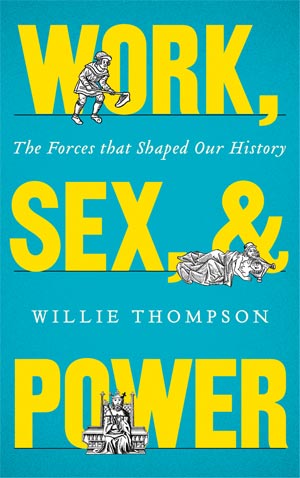
The entire human history of exploitation and oppression is vividly summarised in Willie Thompson’s Work, Sex, Power, finds Mike Quille

Willie Thompson, Work, Sex and Power (Pluto 2015), 288pp.
‘Every document of civilisation is also a document of barbarism’remarked Walter Benjamin, pointing to the oppressive reality of life for most of our forebears, which is ignored or denied by so many history books. Willie Thompson’s new history of humanity, from the emergence of Homo Sapiens in Africa to the current debates about inequality and climate change, is a sobering and sympathetic account of the lived experience of most people.
There have been quite a few attempts after the new millennium started to present accounts which try to explain the underlying features and patterns of the history of the whole of humanity. Why is this, I wonder? It may be because of our common, global economic and cultural subjection to the capitalist oligarchs of the US and EU. It may be because of technological advances like the internet, and social media. But above all, surely the growing awareness of potential environmental catastrophe for humanity brought on by climate change is sharpening our appetite to review the past, so that we can plan for the future.
The book is in this tradition of ‘big history’, and is firmly grounded in Marx’s historical materialist method, in its acceptance of the decisive explanatory power of economic arrangements in conditioning human agency and consciousness. However, unlike some Marxist accounts, he avoids economic determinism, and does not attempt to shoehorn the realities of failed struggles, and the myriad class, gender and personal accommodations and ‘forced co-operations’ which constitute the bulk of human history, into a crude, simplistic framework.
Focus: work, gender and power
Instead, he presents a pithy but comprehensive account of all aspects of human experience, weaving the three themes of the title into a chronological narrative from Palaeolithic times to the present day. The focusonworkshows the central importance of the transformations of work and the relations of production which occurred 10,000 years ago in the shift to settled, agricultural communities, and the more recent transformation to the modern industrialised world of wage labour and market economies, built on the technologies of fossil-fuel extraction.
The focusonsex, gender and kinship illuminates the history of oppressive, misogynistic personal relationships and social structures, closely linked to the development of class-based societies. Both genders have been subjected to the contempt of the upper orders, terrorised by the threats of lords, laws and priests, treated like dirt and their lives held cheap and readily ended.
One half of the species, however, has endured the greater suffering. Men have exploited women at all times and in all societies, in different ways ranging from making women serve as domestic drudges and brutally driven field workers, to the domestic violence, physical mutilation and systematic sexual exploitation of young girls, which is currently being uncovered on an almost daily basis.
If human history has been the history of forced labour and misogyny, it has also been the history of the subjection of most people by ruling elites, and the focus on power clarifies the interlinked mechanisms of political, economic, military and ideological power, through which a few people get most other people to do as they’re told.
Thompson’s resolutely materialist approach, however, does not prevent an understanding of the importance of belief systems in motivating humans. For example, there is a cool but balanced appraisal of religion, which explains its power both as an ideological instrument of ensuring conformity and obedience to existing power structures, and its disruptive and sometimes revolutionary capacity to inspire massive political change, as well as provide some personal consolation and social solidarity.
Resistance
Along with these accounts of the many forms of man-made suffering comes the story of resistance, however. Thompson shows how resistance has occurred for millennia, since at least the strikes by ancient Egyptian pyramid-builders, but he concentrates mainly on the large-scale resistance to elite and male power that has developed in the modern era. One particularly insightful chapter deals with the ‘promise and paradox’ of socialism, and its (mostly failed) attempts at world transformation ranging from utopian socialism to anarchism, communism and the Communist bloc of the twentieth century.
Despite the clear-eyed acceptance of the realities of human suffering and failed struggles, the book’s conclusion is nothing less than inspiring. The socialist project of human emancipation may have had only partial success so far, and may have underestimated the time needed to clear away the social muck of a hundred centuries, but it remains on the table. It is a viable if by no means inevitable solution to our problems, including our subjection to finance capital, scathingly summed up by Thompson as‘bankers stuffed with bonuses who take off in their private jets to preach austerity to everyone else’ (p.247).
For Thompson, the choice between socialism and barbarism has never been more urgent and important. Perhaps, he suggests, Benjamin’s aphorism could be reversed, and documents of true civilisation could emerge from our shameful history of barbarism.
Notes
A shorter version of this review is published in the Morning Star.

